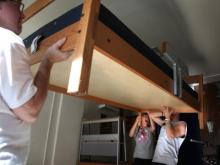Both you and the other person should be respectful and feel respected at all times during an argument. If you can feel the tension rising in the room (e.g. escalated voices, inappropriate language) use your words to bring attention to this. It might be more constructive to walk away and return to the issue at a later time.
Experiencing conflict is healthy but can also be confusing or stressful. Students engaged in conflict resolution may wish to have an advisor, an attorney, parents, or others provide support. The Statement outlines the role third parties have in the conflict resolution process. Remember, OSCR is here to help! OSCR has trained staff to assist members of the Michigan community with conflict resolution.
Tips for Resolving Academic Conflicts
Academic conflicts can be stressful and overwhelming for U of M students. It can be difficult to get these conflicts resolved independently while trying to keep up on reading, writing papers, and studying for exams. Fortunately, there are resources provided by OSCR that can help you resolve academic conflicts in a peaceful and socially just way. Some academic conflicts involve grade disputes with a professor. These can be challenging to experience on your own.
Tips and Tools for Constructive Conflict Resolution
When we act, we often act in relationship to others. When considering which actions may be most constructive when acting amongst others, the following tools may be helpful.
Facilitating Roommate Conflicts: Common Mistakes & Best Practices for RAs
As a resident advisor there are many situations, complications, and surprises that will occur throughout the year. One of the most common will be roommate conflicts, and in order to handle them effectively, resident advisors need to be equipped with the appropriate skills. The following article is going to outline some of the common mistakes resident advisors can easily make when facilitating a roommate conflict, and it will also give tips on how to successfully navigate the conversation to resolution.
RA to RA: If I Knew then what I Know Now-Confronting Conflict among Residents Constructively
Every RA knows or quickly learns that this job is unpredictable. Each day brings a new adventure, duty situation, or conflict that we imagine could have never possibly happened anywhere else on this planet, ever. While we must learn to adapt and roll with the punches, there is some advice that is pretty standard when dealing with any kind of conflict. Here you will find some pieces of knowledge that returning RAs & Hall Directors swear by when confronting conflict on their floors and in their buildings.


